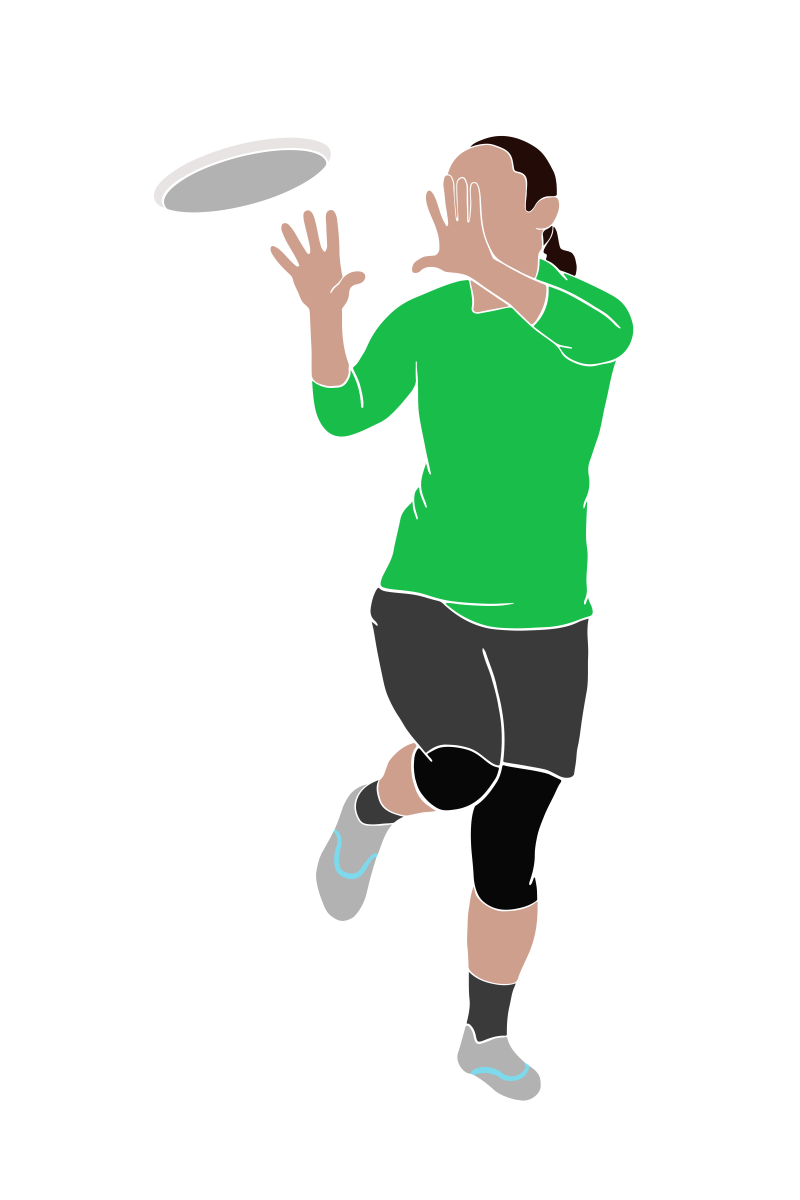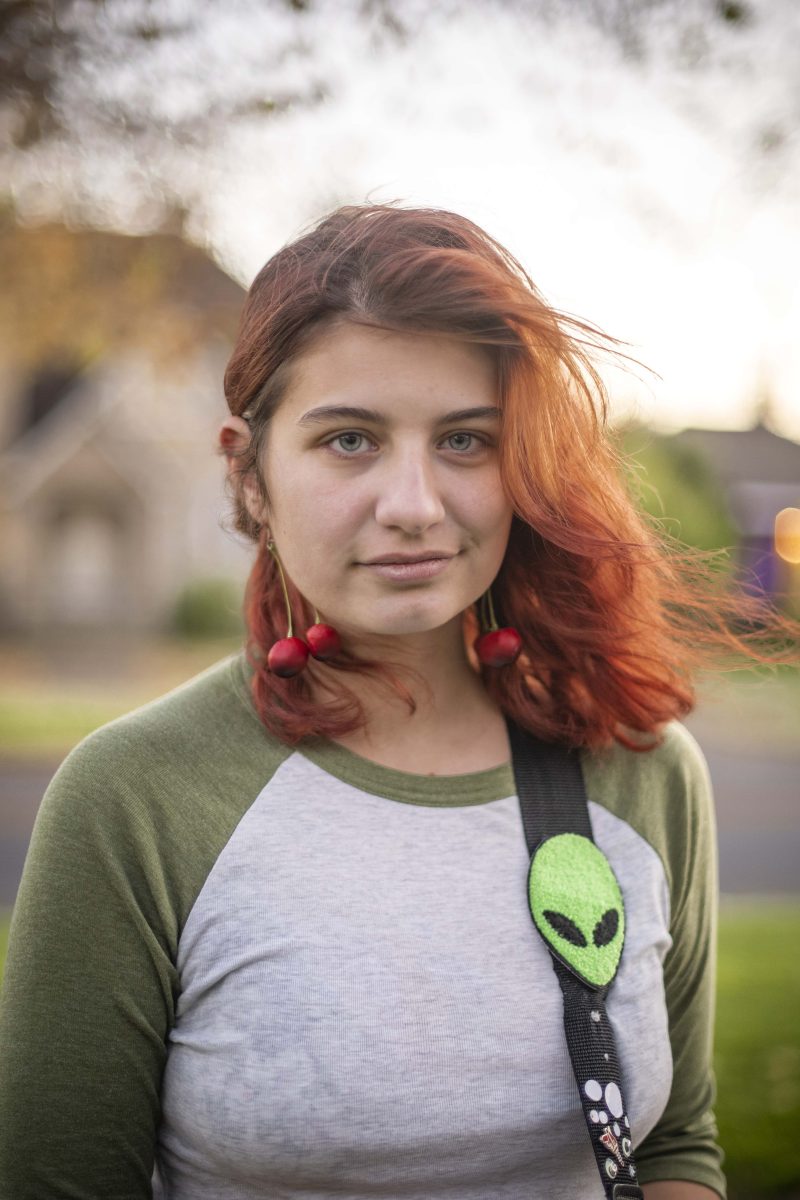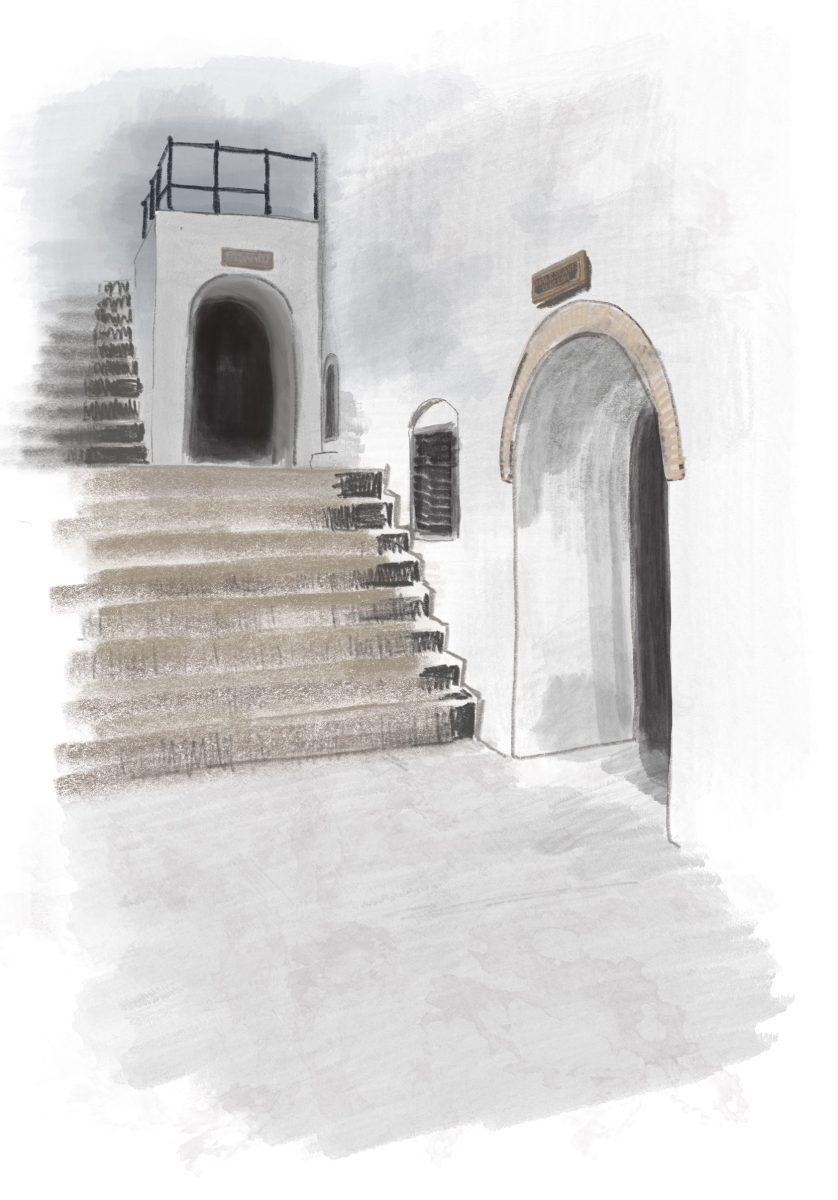It was 3:30 p.m. on a Wednesday and the players trickled onto the field on their bikes. They quickly dismounted and threw their bikes and bags onto a damp and grassy hill on the edge of the Riverfront fields. The players jogged onto the field and started practice.
On one side of the field, smog was coming from a white factory-like building. The other side hugged the Willamette River. The trees by the river were losing their leaves enough to see through the branches. Right beyond them, a thick fog swallowed Autzen Stadium, and the team could faintly hear the University of Oregon marching band playing. But on the Riverfront fields, 15 Fugue players – the UO women’s ultimate frisbee team – started their throwing drills without paying any mind to the music.
The field they practiced on looked less like a sports field and more like a neglected lot of grass. It didn’t have painted lines to separate Fugue from the men’s ultimate frisbee team that was practicing right next to them. Old trash and abandoned mouthguards lay on the outskirts of the field. Damp grass clippings stuck like glue onto the players’ cleats as they ran, but none of the unusual qualities of the field fazed the players. They were focused on getting through a wet and sticky practice.
But their work doesn’t end when they leave the field. Co-captain Rachel Hess says Fugue players spend just as much time off the field as they do on it. They are also responsible for scheduling practices, finding coaches, booking plane tickets and buying uniforms. The team receives some logistical and financial support from UO Club Sports, but it doesn’t meet all of the team’s needs. To keep their team running, Fugue uses teamwork both on and off the field.
Lack of safe practice conditions
During the off-season, Fugue plays on the uneven and overgrown Riverfront fields, which aren’t well-suited for any sport.
“A lot of people have gotten injured on those fields,” Hess says. One player twisted her ankle on the field and was out for four weeks. Players who were injured in the past practice less during the off-season because they’re scared of injuring themselves again on the Riverfront fields, player T.K. Tarvin says.
To reduce the chances of injury, Fugue avoids sprinting or jumping drills, but these adjustments make them practice less than they need to.
Injuries become less of a problem during the regular season, when Fugue plays on UO’s turf fields, Hess says. Playing on turf fields allows the team to practice more intensely and freely.
But there’s a catch: Intramural sports get priority over club sports to pick field times. Hess says that after intramurals set their practice times, the competition between other club sports can make it difficult to pick reasonable practice times.
Because of the competition and lack of priority for practice times, Fugue often gets stuck with odd practice times. Some years, they had 6 a.m. frosty winter practices. Other times, they’ve had practices that ended at 10 p.m. This makes Fugue less accessible, Hess says.
Construction at Hayward Field hasn’t affected the team significantly, but with fewer fields for all the UO intramurals and club teams to share, competition for practice times will be even fiercer than before, player TK Tarvin says.
The fields at UO are free to use, but Hess says Fugue has considered renting fields out in the Eugene community to make practice more accessible. Players would be able to determine their own practice times and have better conditions during the off-season. Renting field space solves their scheduling issues, but it only adds to their list of expenses.
Club funding
Fugue receives some funding from UO Club Sports, but most of their expenses are covered out-of-pocket or through fundraising. Since Fugue is mostly on its own, it tries to make cuts where it can to keep dues low. Players use discs they already own and their coaches are unpaid community members.
“It’s really freaking hard having to worry about if we have enough money to send more than one coach to a tournament,” Hess says. “Having to pay out of your own pocket for uniforms, travel, and all that stuff, it’s a pretty big pressure.”
Tarvin says that some teams have dues that are over $1,000, whereas Fugue’s dues range from $100 to about $300 per person each season.
To offset their costs, the team fundraises year-round, adding more hours to their workload. The additional time spent off the field on Fugue is what co-captain Maddy Boyle calls a “hidden cost.”
“Most people on Fugue are full-time or part-time students, but they also work,” Hess says. “One thing we really try to do is make Fugue accessible to everyone by lowering the costs of dues.”
Juggling priorities
Even with the relatively low dues, players like Tarvin have considered quitting because of affordability. Tarvin quit the track team at Mount San Antonio College to join ultimate frisbee at UO. Used to the amount of funding for track, Tarvin expected ultimate frisbee to have the same funding for uniforms and equipment. But when she joined Fugue, Tarvin wondered where the uniforms and equipment were. She was in for a rude awakening: unlike the sports Tarvin used to play, there wasn’t a lot of money supporting ultimate frisbee. And she didn’t have much to spare either.
Coming from an economically underprivileged background, Tarvin works up to 40 hours every week to pay for school and Fugue, not counting the babysitting gigs she has on the side. When she gets home from her long days, Tarvin immediately starts her schoolwork and usually finishes at 2 a.m. Despite Tarvin’s hectic schedule, she says she makes time for Fugue as best as she can, but sometimes her commitments conflict and she has to miss some practice time.
“It’s so hard to manage both, especially at the beginning. And I was getting sick a lot and not sleeping, but now I’m a lot more used to it and can manage my time effectively,” Tarvin says.
Tarvin was faced with a choice between working and playing with Fugue once when she had to leave practice 20 minutes early. As she was leaving, a teammate asked her to stay, not understanding why she had to go. With the goal of nationals in mind, Tarvin says her teammate wanted to make the most of every minute of practice. Leaving early meant that Tarvin wouldn’t be able to fully use the team’s practice time.
But Tarvin was leaving practice early not just to work, but also to make sure that she could afford to be a part of the team. The money she’d make from the babysitting job would ultimately go to Fugue dues. To help her teammates understand her situation, Tarvin said, “The most reasonable thing is for me not to do Fugue, but I like it so much that this is all that I can give.”
Tarvin knows that playing ultimate frisbee makes her schedule tight and adds to her financial pressure, but she says that when she sees her teammates’ crying and laughing faces after a win, she knows it was worth staying.
Fundraising opportunities
Tarvin is also part of Fugue’s fundraising committee. She says the primary way that Fugue fundraises is through “Rent-A-Fuguer.” The Eugene community can “rent” a Fugue player to pick up odd jobs such as helping people move or doing yard work. The money they earn can go towards their own dues. Players can also do fundraising for the team in general, which can go to general expenses or to other players’ dues, Tarvin says.
Tarvin also says that friends, family and alumni donations are another source of funds. When the players send out a certain number of donation solicitations, UO Club Sports agrees to help cover the costs of going to nationals. But she says donations are unreliable for funding because they fluctuate from year to year.
In addition to the fundraising committee, Fugue players take on leadership roles and split into committees to handle the team logistics. UO Club Sports offers resources and help where they can, but the players are in charge of all the logistics of the teams.
Club leadership
The president and the three Fugue co-captains share the leadership of the team. Fugue’s president, Shae Davis, handles all the logistics, while the co-captains work with coaches on practice plans and strategies. The president works closely with Club Sports to facilitate functions that the team plans. Co-captains plan practices and work on building the team culture that is productive towards their goals.
Hess says that she puts in over 10 hours a week doing captain work off the field. “It’s definitely like a part-time job, but I don’t get paid,” she says.
The rest of the players are split into different committees to handle fundraising, treasury, logistics, recruitment and equipment. Players plan out their events and responsibilities accordingly.
“Everyone has a role. Everyone gives something and everyone gets something back,” Hess says.
Bonding as a team
Fugue’s teamwork on and off the field is rooted in their bonds with each other. In their huddle while talking about strategy, they joke and debate about the correct way to spell “sco.” They also keep a buddy system to have a go-to person on the team that will support the players no matter what. The system helps keep the players accountable and provide emotional support, making the team’s bond stronger.
“Once you’re in the Fugue family, you’re in it forever,” Hess says.
The Fugue family is comforting for incoming players, especially ones from out of state, like Ava Jones. Originally from Arlington, Virginia, Jones was sure that she would stay on the East Coast for college, but her friends who played for Fugue convinced her to consider UO. She flew to Eugene to visit the campus and meet up with her Fugue friends, with whom she spent time getting to know. Before Jones even attended practice, she says she decided to go to UO for Fugue.
“I was kind of nervous about going to school across the country, and I felt like I would be okay because they seemed like people who would be super supportive and act like a family,” Jones says.
Her transition into college life was easier knowing that she had a support system ready for her when she settled in Eugene. “It’s a way to bring people together,” Jones says about Fugue.
Now a sophomore, Jones says she appreciates having some of her teammates as her closest friends because they understand her commitment to the sport. She also says that the friendships on the team help strengthen their teamwork on the field.
“Working hard [during practices] is also working hard for yourself, but also for each other,” Jones says. “And that working hard together gives you an outcome that you can celebrate and that you can enjoy together as a team.”
Fugue has consistently attended nationals for the past decade, eight years in a row. While they’ve proved their abilities at nationals, the team is now moving into a growing phase. Hess says their focus this year is on rebuilding the team.
“In the past we’ve had very low numbers, which has been hard,” Hess says about the number of players. “At some practices we would have like 10 players, which is just so hard on your body and mind. You just can’t get through a three-hour practice with 10 people.”
Recruiting
After some of their crucial players graduated last spring, Hess says she and the co-captains are now looking to the rookies and to each other for the support they need to build up the team’s numbers and skills.
This year they have over 20 rookies. Some of them have prior experience, but a lot of them haven’t played ultimate frisbee before. With this year’s batch of rookies, Hess says she hopes to establish a B-team for Fugue, which is common for college frisbee teams. A B-team, similar to a junior varsity team, would help grow the program by taking in more new players and training them to reach their fullest potential. The alternative is to turn away less experienced players after tryouts and hope that they may try out again next year, but that option doesn’t sit well with Hess.
Jones says that Fugue is not just about building up their team to be the best they can be, but also about teaching people to love ultimate frisbee. Taking in as many eager players will help the overall sport grow.
“It’s really important to teach [the rookies] to love the sport as much as the rest of us do and that’s how we can be successful,” Jones says. Rebuilding the team starts with going back to what makes Fugue players love ultimate frisbee in the first place. The work and skills will quickly follow.
Fugue takes its name from the musical term that describes how a melody starts with one part and then gets taken up by other parts to make a more complex melody.
“It’s how we like to imagine our team – we all are individuals that have different skills and personalities we bring to the table,” co-captain Boyle says. “As the season progresses, the players develop into a complex and interwoven team that create our own beautiful and powerful melody.”
As the players moved into their next drill, the UO marching band’s tune faded. Fugue’s chatter and cheer filled the air, making frigid winds a little warmer. The team’s spirits are high this year, and they’re ready for what’s next.
By the end of the three-hour practice, the players were exhausted. Soon they would need to bike or walk home in the dark. These long days are the price the players pay for Fugue, but a price worth paying. All their work and money goes into finding their harmony as a team, and once they find it, nothing can stop them.
Illustration by Garrett Dare








![[Photo Courtesy of the Lara Family]
Ruben embraces his beloved childhood goat, Katrina.](https://ethos.dailyemerald.com/wp-content/uploads/2025/05/katrina-1-1060x1200.jpg)


